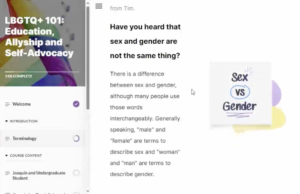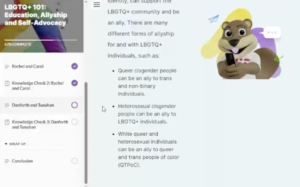The Massachusetts Institute of Technology (MIT) is forcing students and faculty to take a training course titled “LGBTQ+ 101” that pushes radical claims such as that it’s an “act of violence” to use the birth name of an individual who identifies as transgender.
Titled “LGBTQ+ 101: Education, Allyship, and Self-Advocacy,” the online training module fulfills a requirement for teachers, staff, and graduate students on preventing sexual harassment. It consists of a series of videos, vocabulary lists, and reflection questions. “Staff, faculty, and postdocs all join you in viewing this educational resource,” the training states.
The training pushes a number of radical Left-wing views on sex, before making trainees answer a series of “knowledge checks,” multiple choice questions that must be answered correctly in order to proceed. The private training module was obtained and viewed in full by The Daily Wire.
One portion discusses and defines the concept of “deadnaming,” using the birth and often legal name of an individual who identifies as transgender and who has taken on a new name. The training defines it as “the act of referring to a transgender or nonbinary person by a name they used prior to transitioning.” It even goes on to say “deadnaming is invalidating and may trigger a trauma response” and warns against “misgendering.”
But beyond just being perceived as offensive, “deadnaming” is said to be violent. “Even when done accidentally,” it “brings all of their negative life experience with that name to the surface … it is considered a violent act.”
The training also insists that sex and gender are distinct. “There is a difference between sex and gender,” it says. “Generally speaking, ‘male’ and ‘female’ are terms to describe sex and ‘woman’ and ‘man’ are terms to describe gender.” It goes on to claim that “gender is a spectrum.”

The Daily Wire
The training also discusses “gender-affirming care,” calling it a “range of social, psychological, behavioral, and medical interventions designed to support and affirm an individual’s gender identity when it conflicts with the gender they were assigned at birth.” It goes on to claim that “these interventions help transgender people align various aspects of their lives – emotional, interpersonal, and biological – with their gender identity.”
“Non-binary,” meanwhile, is defined as a “term for diverse gender identities” that are “outside the gender binary.”
An MIT spokesman told The Daily Wire that faculty, staff, and graduate students in their third year are required to complete a training module aimed at preventing sexual harassment, and that there are two other options available in addition to “LGBTQ+ 101.”
The other trainings include “Responding to Disclosures at MIT,” which explores “behaviors that constitute sexual harassment” and “how to support someone who discloses to you,” and “Power Dynamics,” which explores “ways in which power manifests in our relationships and your attitudes towards power, including your feelings about having power and the authority of others.”
Staff and faculty are also instructed to make their workplaces more “affirming” by using certain terms and avoiding others. “Provide space regularly in your lab/department/office/classrooms to share their pronouns. Avoid using binary gendered language … instead use ‘they’ and ‘people’ as gender neutral terms,” the training says.
“Are you a visible, dependable ally?” the training asks. “What have you done recently, or what are you planning on doing, that can contribute to a feeling of LGBTQ+ belonging at MIT?”
A portion titled “let’s talk about allyship” assures trainees that “there are many different forms of allyship” before explaining “queer cisgender people can be an ally to trans and non-binary individuals” and “white queer and heterosexual individuals can be an ally to queer and trans people of color.”
“What are some specific steps that you can take to be an active ally /better advocate on behalf of LGBTQ+ members?” it asks.

The Daily Wire
The training repeatedly implores listeners to take action to further the LGBT agenda, asking again “What can you do at a policy level … to help influence/change policies to be more LGBTQ+ inclusive within your lab/department/classroom?”



Post a Comment